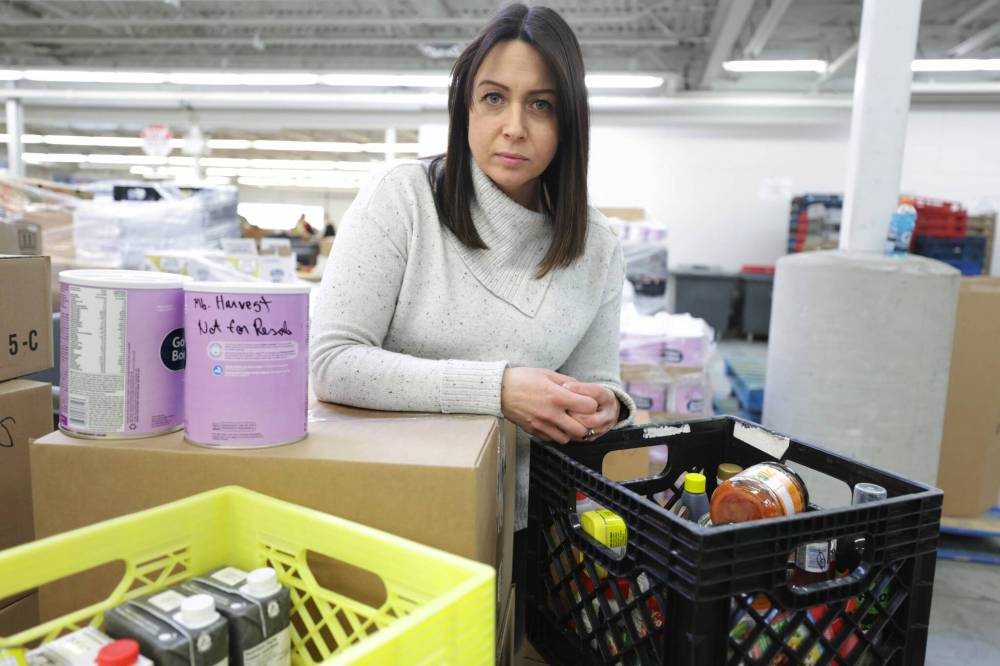Kehinde Jasper is an entrepreneur, a mother of four and a soon-to-be-graduate of Red River College’s business management program with plans to open up her own food truck.
She also uses food banks every month.
“I think that’s a misconception, when someone uses the food bank it means they have no money,” said Jasper, who receives a hamper from Harvest Manitoba each month.

RUTH BONNEVILLE / FREE PRESS FILES
Harvest Manitoba director of network, advocacy and education Meaghan Erbus: “Folks are accessing our services because they don’t have enough money to make ends meet.”
Jasper said she would never be able to afford all the items she receives in the hamper and the gift helps her save money to raise her children while she’s in school full-time.
Jasper fits in the demographic Harvest is increasingly serving, according to its 2024 Harvest Voices report: women, people with children and people who are employed.
The document, which surveys food bank recipients to better understand its clientele, shows 45 per cent are employed either part time or full time, 62 per cent have children and 68 per cent are women.
In previous years, single men made up the majority of Harvest Manitoba’s clients, said Meaghan Erbus, the non-profit’s director of network, advocacy and education.
This year, women are disproportionately represented.
“Often they’re in caregiving roles that often require them to take employment that is either lower paying or is precarious,” Erbus said.
Jasper, a Nigerian immigrant, is the sole caretaker of her children while her husband works to emigrate to Canada. The 46-year-old has been using the food bank for more than a year.
“It’s helping me save, like, $100 of what I would have used to go and buy in a grocery store,” she said.
The Harvest report shows one in 10 clients access food banks because they are single parents and 66 per cent live on an annual income of less than $20,000. Most recipients live under the poverty line, which for the average family in Winnipeg sits at $53,064 per year.
More than 50,000 people have used Harvest food banks monthly across the province, a record high. CEO Vince Barletta attributed the increase to inflation and decreased buying power in grocery stores.
The survey found 97 per cent of food bank clients say current food prices affect the way they shop and 88 per cent are unable to afford healthy food.
“Folks are accessing our services because they don’t have enough money to make ends meet,” Erbus said.
October’s consumer price index shows food prices in Manitoba increased by 4.2 per cent from last October. Nationally, food prices increased three per cent year-over-year.
Most clients access food banks due to a general lack of income to make ends meet (58 per cent). Other reasons include: living on savings (16 per cent), loss of job (15 per cent) and being a newcomer (14 per cent).
The role of food banks has increased over the decades because underlying issues have yet to be addressed, Barletta said. The report states it is “essential” all levels of government implement policies that improve economic and social structures to decrease reliance on food banks.
“This government, and in all jurisdictions and of all political stripes, have really failed to make progress on key issues that are driving people into challenges of food insecurity,”Barletta said.
The report made 10 recommendations to address poverty and food insecurity including: creating a provincewide food security strategy, addressing inflation and food prices, increasing minimum wage, improving access to low-barrier employment, skills training and educational opportunities, increasing spending on social assistance and considering a universal basic income, increasing federal disability payments, increasing capacity and affordability of child care and addressing the housing crisis.
Barletta and Erbus said without a comprehensive food security strategy, food bank use will continue to increase.
“Harvest will be here. Our job is to meet these immediate needs, and we will continue to do that,” Erbus said. “We call on the government to reach out to these folks to understand what’s going on their lives, to find out what good policy looks like in order to make this long, lasting change.”
nicole.buffie@freepress.mb.ca

Nicole Buffie
Multimedia producer
Nicole Buffie is a multimedia producer who reports for the Free Press city desk. Born and bred in Winnipeg, Nicole graduated from Red River College’s Creative Communications program in 2020 and worked as a reporter throughout Manitoba before joining the Free Press newsroom in 2023. Read more about Nicole.
Every piece of reporting Nicole produces is reviewed by an editing team before it is posted online or published in print — part of the Free Press‘s tradition, since 1872, of producing reliable independent journalism. Read more about Free Press’s history and mandate, and learn how our newsroom operates.
Our newsroom depends on a growing audience of readers to power our journalism. If you are not a paid reader, please consider becoming a subscriber.
Our newsroom depends on its audience of readers to power our journalism. Thank you for your support.